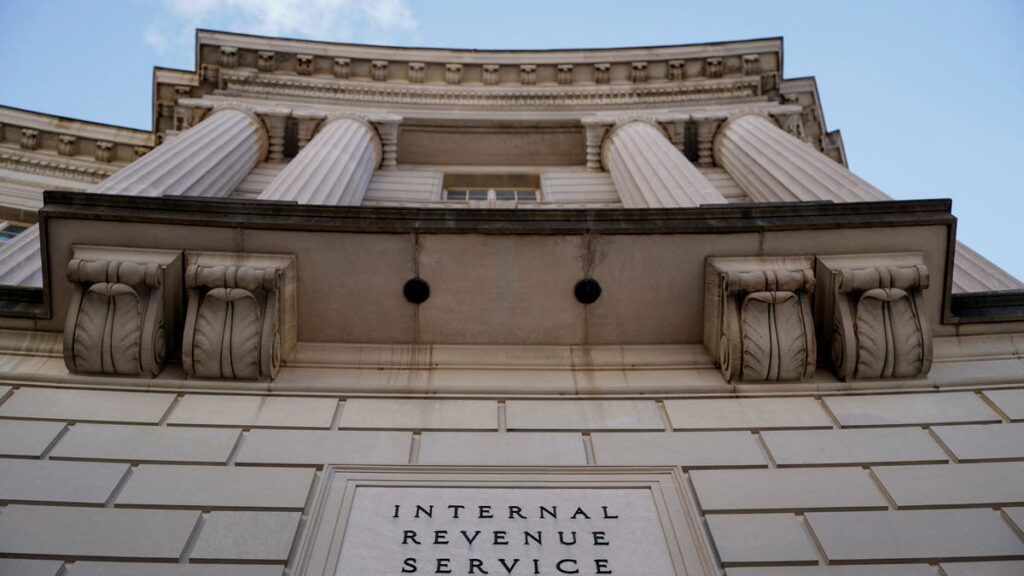Many Americans hesitant to file taxes amid IRS workforce cuts, survey finds
Think fewer IRS agents means you won’t get audited? Experts say think again.
Scripps News
The Trump administration is cutting hundreds of thousands of federal jobs, with a goal of saving money.
At the IRS, however, the cuts may actually cost money.
Imagine the local hospital firing its collections department, or your favorite charity laying off its fundraising staff. That is more or less what’s happening at the Internal Revenue Service, according to a new report from the nonpartisan Budget Lab at Yale University.
The Department of Government Efficiency (DOGE) is cutting workers at an agency that collects almost all federal revenue. The smaller its staff, economists say, the less revenue the IRS can collect. More cuts mean less revenue.
According to a leaked email, CNN reports, the Trump administration aims to cut approximately 18,200 IRS positions by mid-May through layoffs and buyouts. Other reports suggest the agency may ultimately shed as many as half of its 100,000 workers.
If the IRS lost 18,200 workers, the cuts would yield a cost savings of $1.4 billion in 2026, the Yale researchers report. Yet, because of its smaller staff, the IRS would generate $8.3 billion less in tax revenue next year. The net cost, in lost revenue, works out to roughly $6.8 billion.
If the IRS staff remained depleted over the next 10 years, the cumulative cost in uncollected tax dollars would reach $159 billion, the Budget Lab reports.
“If you’re trying to save money, you don’t cut the place revenues come from,” said Vanessa Williamson, a senior fellow at the Urban-Brookings Tax Policy Center, a joint endeavor of the Urban Institute and Brookings Institution.
IRS expects $500 billion less tax revenue
Already, the Treasury Department projects at least a 10% reduction in the tax revenue the IRS collects this spring, because of the cuts, the Washington Post reports. That equates to more than $500 billion in lost revenue, a sum larger than the annual budgets of most federal agencies.
A leaner IRS will collect less revenue, economists say, because many fired workers toiled on the agency’s compliance efforts, auditing tax cheats and collecting unpaid tax dollars, the New York Times reports. Other fired workers were involved in modernizing IRS technology or helping taxpayers by telephone, activities that directly or indirectly generated revenue.
The Yale analysis “starts with the idea that every dollar that the IRS spends on an employee, they get a return that’s higher than a dollar,” said Richard Prisinzano, director of policy analysis at the Budget Lab.
Auditors, in particular, bring in big bucks. For every dollar spent auditing an earner in the top 1%, for example, the IRS reaps more than $4 in recovered tax dollars, research shows.
Tax scofflaws fear audits. As word spreads that auditors are losing their jobs, wealthy individuals and corporations are more likely to skirt tax laws, Prisinzano said.
“When you say to somebody, ‘Your probability of being audited went down by 50%,’ they might increase their risky behavior, because they’re less likely to be caught,” he said.
Republicans want fewer audits of wealthy Americans
The DOGE cuts help fulfill a Republican pledge to scale back audits of wealthy Americans.
The Biden administration added nearly $80 billion in new IRS funding, largely to collect unpaid taxes from the wealthy. Republicans decried the audit campaign as an assault on middle-class Americans and small businesses.
IRS critics note that many audits end in failure. Litigation statistics show that “the IRS makes a lot of mistakes,” said Chris Edwards, an economist at the libertarian Cato Institute.
The Yale report “is faulty, because it doesn’t take into account the collateral damage on the private sector,” Edwards said. “If you have a more aggressive tax agency demanding more information from more people, a lot of that is going to be compliance costs on people who are already following the law.”
Trump’s critics see the IRS cuts as part of a larger campaign to lower taxes on the rich, through outright tax cuts and by enabling wealthy tax evaders.
“Attacks on IRS funding are basically a very reliable way to reduce the taxes of the richest households without actually passing a law that cuts tax rates,” said Josh Bivens, chief economist at the left-leaning Economic Policy Institute.
A perennial struggle to close the ‘tax gap’
IRS cuts matter, economists say, because the agency is locked in a perennial struggle with taxpayers to collect unpaid taxes.
The taxing agency reports an annual “tax gap,” the difference between how much tax is owed and how much is paid on time. Yale researchers project a tax gap of $769 billion in 2026. If the agency is hobbled by 18,200 layoffs, the researchers say, the gap will swell by an additional $134 billion.
Wealthy Americans are responsible for most of the tax gap. By the Budget Lab’s calculations, the top 1% of earners owe 28% of all unpaid taxes. The poorer half of America owes about 5.5% of the balance.
Less-wealthy taxpayers pay tax at a lower rate. Most of their income is reported directly to the IRS. For those Americans, “it’s very hard to evade taxes,” Prisinzano said.
The wealthy have a lot more money to tax, and they are taxed at a higher rate. Their tax returns are more complex, and it’s harder for the IRS to document their earnings.
“It’s people with fancy lawyers and accountants who create the tax gap, primarily,” Williamson said.
If there weren’t some threat of audit, economists say, wealthy taxpayers might routinely cheat on their taxes. The question is, How many auditors does the IRS need?
“You don’t want no auditing,” said Edwards of Cato. “On the other hand, you don’t want an auditor in everyone’s living room, examining their laptop.”
